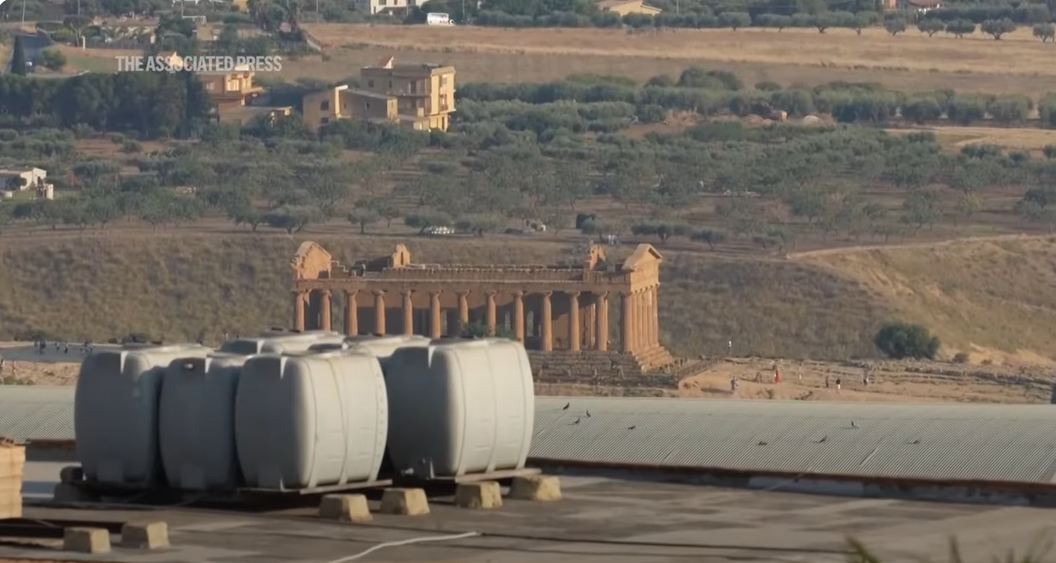The island of Sicily, known for its rich history and beautiful landscapes, is facing a serious water crisis that has sparked widespread protests among its residents. The situation has reached a tipping point as the lack of water and continued rationing have pushed the population to the edge of their patience.
The water shortage in the southern island is chronic, Sicilians have been dealing with water scarcity not just for years, but for centuries. Indeed, disputes over water rights and access have been a major cause of feuds and social unrest. The present crisis is the worst that residents have seen in the past twenty years and the rationing is affecting over a million people. The year 2023-2024 has brought almost no rain.
The long-standing water scarcity is today exacerbated by a combination of factors including climate change, outdated infrastructure, and government inaction. This year’s shortages have been particularly severe, with heavy rationing in place across 93 communities, leaving faucets dry and citizens desperate for a reliable water supply.

The frustration of the people is palpable. In early August, the streets of Agrigento, one of the most affected areas, echoed with the chants of “We want water” as approximately 1,500 protesters gathered to demand action. The water only runs every 15 days in Agrigento, a schedule that is unsustainable for the daily needs of its inhabitants.
“We constantly worry about having enough water for essential daily activities, such as cooking, cleaning, and personal hygiene,” said Sicilian Clara Ferrante. She added that, “We are forced to adopt strict conservation and rationing measures, which can be stressful to manage and maintain, especially in the presence of elders and babies.”
The crisis has not only affected households but also the agricultural sector, which is vital to Sicily’s economy. Farmers are struggling to cope with the worst drought in history, worrying about the future of their livelihoods and the possibility of being forced to sell off animals due to the crippling conditions.
The water crisis also poses a dilemma for tourism, a significant contributor to Sicily’s economy. It has led to drastic measures where hotels and inns are forced to turn away guests because they cannot guarantee basic amenities like a functioning toilet or a shower. The situation is so dire that even ancient aqueduct systems and modern water infrastructures are running dry, making it challenging for accommodation providers to meet the needs of their guests. As a result, tourists are reconsidering their travel plans, with many looking for advice on travel forums or directly contacting hotels for reassurance about water availability.
Despite the challenges, Sicilians have shown remarkable ingenuity in adapting to the water shortages. From collecting water from air conditioning systems to setting up individual or communal water tanks, the people have found ways to manage their water needs. Many have resorted to buying water from a private distributor, but to refill a water tank it costs around €250. While they are entitled to claim a refund afterwards from the state, some people cannot afford the upfront cost.

All these ingenious ideas to cope through the crisis are temporary solutions to a problem that requires long-term strategic planning and investment. The closure of Sicily’s three desalination plants–Gela, Porto Empedocle and Trapani– between 2010 and 2014, has left a gap that has yet to be filled.
“They were obsolete, impactful, and very expensive,” Professor Leonardo Valerio Noto of the University of Palermo, explained, saying a modernized one along the lines of Europe’s largest desalination plant in Barcelona might be the solution.
“A large plant would cost about €50 million — a large sum, but one that would be amortized over time,” Noto added.
The Sicilian government has reached out for assistance to import water from the mainland, but a concrete plan to alleviate the crisis is yet to materialize. Thus far eight plans for a long-term solution were considered and discarded as inadequate. In the meantime, after having run out of water, locals are now running out of patience.












